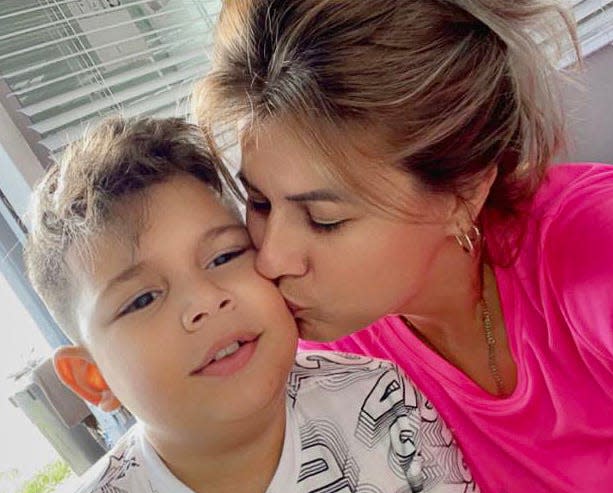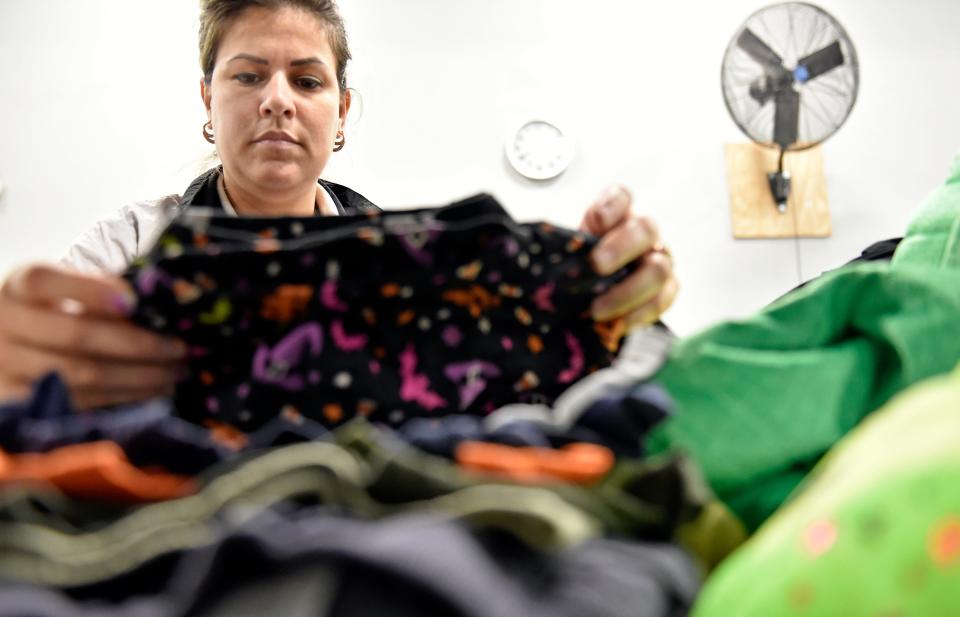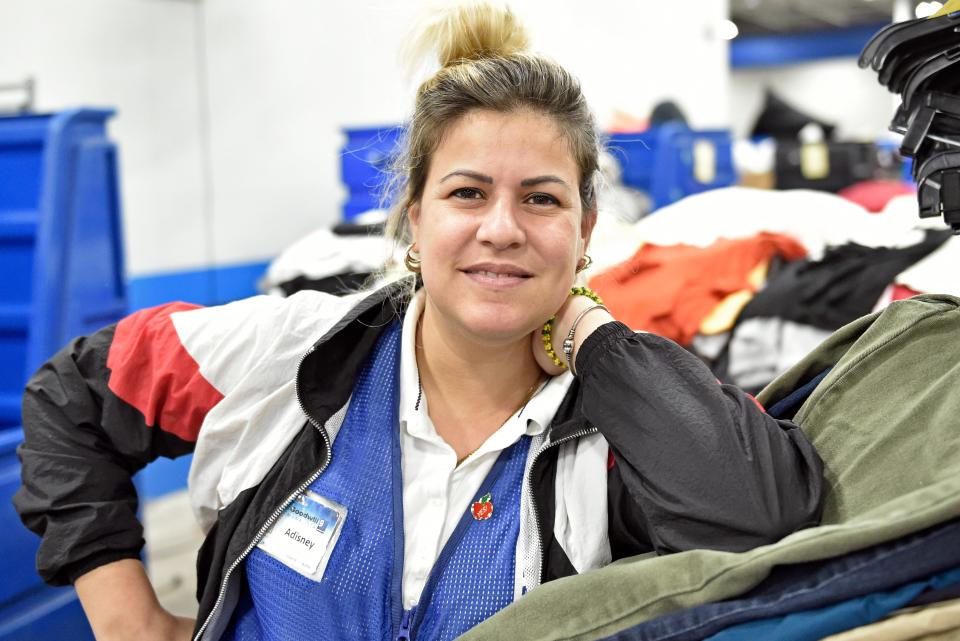Season of Sharing helps settle Bradenton mother and son into new home after fleeing Cuba

As a hundred desperate travelers crowded in behind her, Adisney Armas quickly surveyed the insides of the truck container.
Spotting a small hole in the roof, the young mother positioned herself underneath it with her 7-year-old son. Back home, Adisney had seen stories on the news about these containers – how, locked inside, dozens of people would suffocate to death before they could reach their destinations over the U.S. border.
Below the hole, Adisney set her backpack at her feet, placing little Julio Cesar atop it so he could sit and rest. Before they had left Cuba, she had told her son they were going on an adventure to see his grandma in Florida.
Second to his mother, his abuela was the whole world to the little boy. But he would have to be strong, Adisney had let him know. There would be tall hills to climb and rivers to cross. They would fly airplanes and take boats and canoes. It would be fun, she had promised – her heart inside her throat.
For Adisney, her mother was her anchor, too. The grueling four years leading up to this day last January were that much worse without her mother by her side. But there was no time to think about that now. She knew her son was watching her like a hawk. She had to project courage and strength.
Adisney looked down, flashing him a big grin, while the bodies closed in around them.
“It’s okay, Papi,” she said, letting him know he could get go ahead and some sleep.
Soon Adisney heard the doors close, a bolt turn in the lock. Pinned into a standing position between the other adults, Adisney had no idea how long she might be on her feet. As the truck jolted forward, the travelers swayed as one, and Adisney – a terror gripping her chest – peered up through the silent darkness, searching for that circle, and a small glimmer of light.
A scuttled plan
In those weeks ahead of early January 2023 – as Adisney and Julio Cesar had got on a plane for Nicaragua, boarded buses and small boats through Central America, and climbed onto that truck container in Mexico – they were joining a historic exodus.
In the past two years alone, nearly a half million Cubans have left the island – more than the 1980 Mariel boatlift and the 1994 rafter crisis combined, according to the Washington Office on Latin America.
With tourism plummeting during the pandemic and with heightened U.S. sanctions exacerbating its hardships, Cuba is facing is worst economic crisis since the 1990s.
Adisney was born in the middle of those terrible years in the '90s, known in Cuba as the Special Period – an era of economic depression following the Soviet Union’s collapse.
Raised in the central city of Camaguey, Adisney remembered little of those difficulties. Her mom and dad always had food on the table for her and her siblings. After they separated when she was 5, Adisney lived with her mom and the two were always close.
Adisney followed her footsteps into a teaching career. Universal education remained free through college, but Adisney struggled to get by on a preschool teacher’s salary.
Once Julio Cesar was born, Adisney decided to take a better-paying and more flexible job overseeing cashiers at a local store. By then the country was awash in a new sense of optimism, after the U.S.-Cuba détente during the administration of U.S. President Barack Obama.
American tourists poured in, even to smaller cities like Camaguey, while Cuba’s leaders promised more reforms to come.
But within a few years, storm clouds were forming. The Trump administration in the United States reversed many Obama-era provisions. Tighter U.S. sanctions soon followed, restricting travel and remittances to the island, and hampering Cuba’s access to credit, food and medicine.
Meanwhile, Cubans were growing frustrated with their own government’s slow pace of reforms as living conditions deteriorated.
Adisney’s relatives actively took part in anti-government protests and faced arrest. By 2019, her mother and sister decided it was time to leave. Once in Florida, they would apply for asylum and send for her and Julio Cesar within a year. At least that was the idea.
But into 2020, with her mother and sister settled in Florida, the pandemic’s chaos scuttled their plan.
As shortages and rolling blackouts returned, Adisney was adrift without her mother.
Shortages impacted her work, too. Tensions mounted as Adisney refused to go along with a boss’ scheme to divert goods to the black market. After that, she found herself a target, lumped in with relatives and accused by colleagues of being a dissident.
Adisney got word to her mom. She had to leave. In late 2022, her mother and sister borrowed $5,000 between them and made the arrangements from Florida.
Last year – Adisney and her son packed in with dozens of desperate people from the Caribbean and South America, drawing closer and closer to the U.S. border – her troubles were far from over.

More waiting
After 12 hours on her feet, Adisney felt the truck slow to a stop. By then her legs were throbbing and swollen. But the passengers had another hurdle before them: crossing the river to the U.S. side.
By now Julio Cesar was impatient with the adventure.
“When are we going to get there, Mamá, when is this going to end?” he kept asking.
They were almost there, she told him excitedly.
Carrying her bag on her back and holding on tight to her son, Adisney waded with him across.
On the other side, almost immediately they and many of the others were picked up by U.S. officials.
Adisney felt a huge weight fall off her shoulders.
“We finally made it,” she thought.
Help your neighbors in need: Support Season of Sharing
Now she’d have a chance to ask for asylum, be given a court date, and they could unite with her mother and sister.
“But they never gave me the opportunity,” she recalled. “They returned me.”
In the years leading up to that day, challenges and controversies had arisen around the ability of migrants arriving at the border to seek asylum – a right that is protected under federal law.
“The adventure is over. We have to go back and wait,” she finally had to confess to her son. “It was very hard.”
For the next four days, Adisney and Julio Cesar were bounced between camps on the Mexico side of the border. She could no longer hide her tears.
The little boy knew things had turned serious. But he didn’t complain, she recalled.
In Mexico, placed in camps for mothers with children, they were given access to doctors and good care. Adisney relaxed a little watching Julio Cesar play with other children and a soccer ball. Alerted there about a new humanitarian parole program started that very month by the Biden administration, Adisney filled out a form on her phone and was allowed to return to the border for an interview with U.S. immigration officials.
At last, Adisney could share her story. Afterward, she was given a court date for February 2025, and she Julio Cesar were allowed to enter – stepping out onto the Texas sidewalk, inside the United States.
The next day, at the Tampa International Airport – there were her mother and sister, waiting to see them for the first time in four years.
“We spent two hours crying,” Adisney remembered, laughing.

Cramped quarters
The next half of 2023 passed in a blur – a swirl of happiness mixed with many adjustments.
Julio Cesar enrolled in school in Bradenton, grappling with learning a new language and meeting new friends.
With the help of an attorney, Adisney filed official paperwork for asylum. Living with her sister and mom, she spent her days cleaning and cooking for them all while also studying English and for her driver’s license exam.
This past fall, her work permit came through, and she found a job at Goodwill Manasota, which also provided classes in English.
“I was so happy to be in this marvelous country,” she said in Spanish. “My mom was here and my sister was here, and that was the most important thing to me.”
Before too long more people were filling their small apartment. Next Adisney’s brother arrived from Cuba. Then her sister’s boyfriend moved in. After that, Adisney reconnected with her former boyfriend from Cuba, then living in Texas. Soon he relocated to Florida and moved in, too.
Six adults and a third-grader. The family was tight – always finding fun things to do at area parks and beaches outside the apartment. But even with their close bond, the small quarters were taking a toll. Gripes ensued about plates left in sinks and clothes on the floor.
“There were people in the living room, in both bedrooms, people everywhere,” she recalled. “It’s family – you do what you have to do.”
Adisney turned to Natalie Caukwell, Goodwill’s Jobs Plus Language program manager, for help finding a place to live.
“I told her it’s going to be hard, everyone is looking now,” Caukwell said.

A struggle pays off
Despite the housing crisis, with the help of friends Adisney found a two-bedroom apartment in Bradenton she and her boyfriend could afford – just the two of them and Julio Cesar.
They had saved enough for the deposit but had nothing left for the first month’s rent.
That’s when Caukwell and others at Goodwill applied to Season of Sharing on her behalf, for almost $1,700, covering February’s rent.
This week, they’ll be able to move in.
“Mama, there’s six days left, there’s five days left,” Julio Cesar has been telling Adisney all through the past week.
“He’s counting the days,” she said. “He’s going to have his own room.”
They’ll be 20 minutes from Adisney’s sister and mother, who helps Adisney with childcare.
Once Adisney graduates from her language classes, she can move up to a higher position.
“She will graduate, I know it,” Caukwell said. “It won’t be that long because she’s smart and she pushes for it.”
Adisney is already planning ahead. Under immigration provisions reserved for Cubans who have fast-tracked residency, she is in the process of filling out her paperwork for a green card.
Long-term, when she’s on her feet, she would like to study to become a dental hygienist.
For now, she’s happy to see Julio Cesar thrive. At 9, he’s grasping the language better every month and liking his school.
What’s more – apart from everything she endured the last couple of years – she knows the struggle was worth it.
“I always believed,” she said, “that for my son, if I made sacrifices today, I will see the reward tomorrow.”
How to help
Season of Sharing was created 22 years ago as a partnership between the Herald-Tribune and the Community Foundation of Sarasota County to get emergency funds to individuals and families on the brink of homelessness in Sarasota, Manatee, Charlotte and DeSoto counties. There are no administrative fees and no red tape – every dollar donated goes to families in need to help with rental assistance, utility bills, child care and other expenses.
You can donate to Season of Sharing by going to cfsarasota.org or calling 941-556-2399. You can also mail a check to Season of Sharing, Community Foundation of Sarasota County, 2635 Fruitville Road, Sarasota, FL 34237.
This story comes from a partnership between the Sarasota Herald-Tribune and the Community Foundation of Sarasota County. Saundra Amrhein covers the Season of Sharing campaign, along with issues surrounding housing, utilities, child care and transportation in the area. She can be reached at samrhein@gannett.com.
This article originally appeared on Sarasota Herald-Tribune: Season of Sharing helps settle Bradenton mother and son into new home

